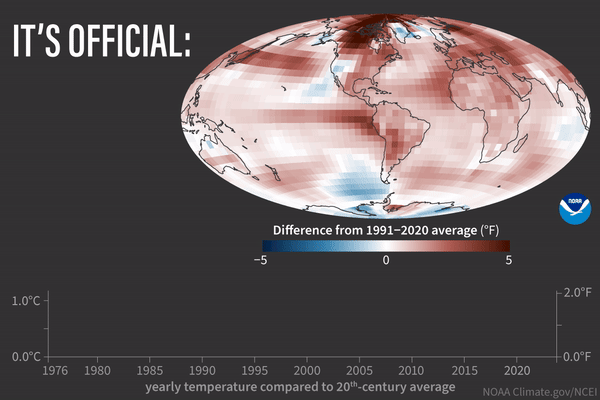New Record Holder! 2023 Was Earth’s Warmest Year — By Far
The recent blasts of cold winter weather might have some folks forgetting about how hot this past year was. But after completing its latest climate analysis, NOAA says 2023 was definitely a year to remember. Turns out, 2023 is now the official recordholder as the planet’s warmest year. And actually, it wasn’t even close.
NOAA’s National Centers for Environmental Information scientists crunched the numbers and found the Earth’s average land and ocean surface temperature in 2023 was 2.12°F above the 20th century — the highest global temperature among NOAA’s 174-year (1850-2023) climate record. It also beats the next warmest year (2016) by a record-setting margin of 0.27 of a degree.
Other notable takeaways from the end-of-year analysis:
Global ocean heat content set a new record – Ocean heat content is a key climate indicator because the ocean stores 90% of the excess heat in the Earth system.
Polar sea ice was deficient – Antarctic sea ice coverage was the lowest on record.
“After seeing the 2023 climate analysis, I have to pause and say that the findings are astounding,” says NOAA Chief Scientist Dr. Sarah Kapnick.” A warming planet means we need to be prepared for the impacts of climate change that are happening here and now, like extreme weather events that become both more frequent and severe.”
Confirmation of 2023 as the warmest year on record is not a surprise. More than a month before the end of the year, NOAA was predicting a greater than 99% chance of it happening. That follows the prevailing trend. According to NOAA, the 10 warmest years since 1850 have all occurred in the past decade.

Graphic courtesy of NOAA Climate.gov, using NOAA NCEI data
And NOAA wasn’t alone in its findings. NASA, the Copernicus Climate Change Service, and the UK Met Office conducted similar analyses that also put 2023 as the warmest year on record.
So, how is 2024 looking? More of the same. NOAA says there is a one-in-three chance that 2024 will be warmer than 2023, and a 99% chance that 2024 will rank among the top five warmest years.
Are you and your crops ready?









